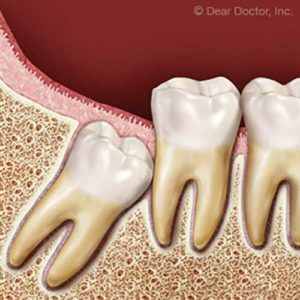Removing Wisdom Teeth Now May Prevent Dental Problems Later

Teeth damaged by decay, periodontal (gum) disease, or trauma are often removed (extracted) if they’re deemed beyond repair. But there’s another reason we may recommend an extraction: a tooth is causing or has the potential to cause problems for other teeth and your overall oral health.
Some of the most frequent cases of “preventive extraction” involve the third molars, or wisdom teeth, located in the very back of the mouth. They’re usually the last permanent teeth to come in, which is related to some of the problems they can cause. Because they’re trying to come in among teeth that have already erupted they don’t always erupt properly, often at abnormal angles or not fully erupting through the gums, a condition called impaction.
Impacted or misaligned wisdom teeth can put pressure on adjacent teeth and their roots, which can cause root resorption that damages the second molar. They can also increase the risk of periodontal (gum) disease in the gum tissues of the second molars, which if untreated can ultimately cause teeth and bone loss.
Because of current or possible future problems with wisdom teeth, we often consider removing them at some early point in the person’s dental development. Such consideration shouldn’t be undertaken lightly, since wisdom teeth extraction is often complex and fraught with complications, and it usually requires a surgical procedure.
That’s why we first conduct a comprehensive examination (including x-ray or other imaging to determine the exact location and possible complications) before we recommend an extraction. If after careful analysis an extraction appears to be the best course, we must then consider other factors like planned orthodontics to determine the best time for the procedure.
Once performed, a wisdom tooth extraction can resolve existing problems now and reduce the risks of gum disease or malocclusions in the future. When it comes to wisdom teeth, removing them may be in your or your family member’s best interest for optimal dental health.
If you would like more information on wisdom teeth, please contact us or schedule an appointment for a consultation. You can also learn more about this topic by reading the Dear Doctor magazine article “Wisdom Teeth.”
